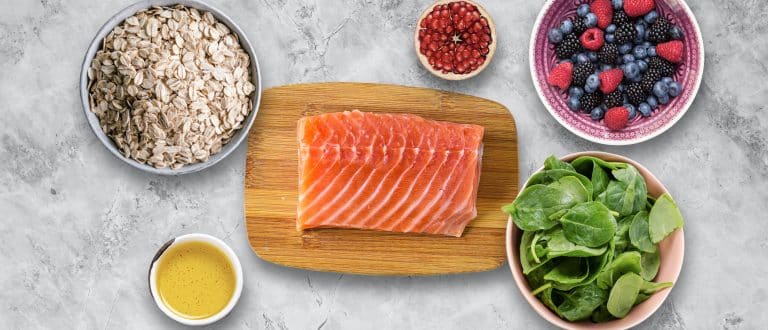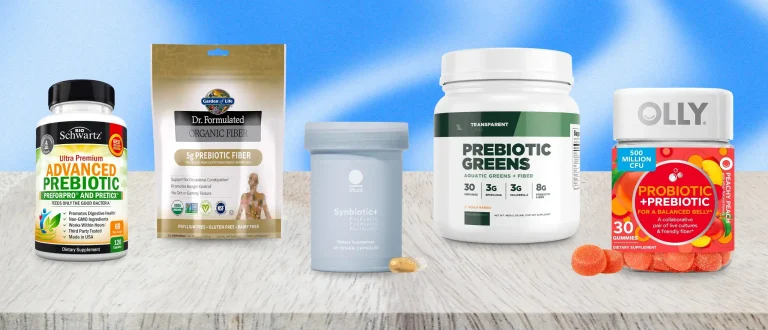Fast Facts
- Probiotics are the good, live microorganisms that live in your body and keep everything from inflammation to immunity to mood in check.
- An imbalance can lead to bad bacteria wreaking havoc on your system, leading to digestive upset, fatigue, skin conditions, and more.
- Taking a daily probiotic with at least 5 billion CFU may help reinstate balance in the gut.
Your microbiome is a vast ecosystem of microorganisms, such as bacteria, spread throughout your body. The largest numbers are found in the small and large intestines. Think of this gut microbiome as your body’s Grand Central Station. A growing body of evidence suggests that it may influence everything from inflammation, immunity, and brain health (1) to memory, mood, and sleep—even your ability to lose weight—and may play a role in a slew of other conditions and diseases, such as IBS and cancer (2). This is all in addition to what it’s best known for—digesting food.
Taking care of this vital hub of microorganisms may have some major pay-offs. One way to do so, may be with the support of probiotics. Research is accumulating to suggest that probiotics may help to regulate the growth of good gut bacteria. But what, exactly, does that entail, and how do you know which probiotics are best?— Here’s the low-down on the best probiotics for men and all the health benefits that may come along with them.
A Quick Look at Our Top Picks of Probiotics for Men
Best Overall: Seed DS-01 Daily Synbiotic
Best Comprehensive: Ritual Synbiotic+
Best Dr. Formulated: Garden of Life Once Daily Men’s
Best Soil-Based: Ancient Nutrition SBO Probiotics Ultimate
Best for Sleep: Dr. Mercola Complete Probiotics
Best Gummy Probiotic: Llama Naturals Prebiotic & Probiotic, Whole Fruit Gummies
Physician-Trusted: Align Probiotic 24/7 Digestive Support Pro Formula
Best for Vegans: NOW Probiotic-10, 25 Billion
Best for Weight Loss: Solaray Mycrobiome Probiotic Weight Formula
Best for Immunity: Culturelle Probiotics Health & Wellness
Best for Prostate and Urinary Health: Hyperbiotics Pro-Men Probiotic: Probiotics for Men
Best for Digestive Health: Cymbiotika Probiotic
Best for Athletes: Thorne FloraSport 20B
What Are Probiotics and How Do They Work?
Our bodies are made up of trillions of bacteria, and while research can’t seem to quite agree on the exact ratio, scientists have proven that our bacterial cells outnumber our human cells (3). Probiotics are the good, live microorganisms that live in your body. Think of the gut as a garden. In this garden, probiotics are the plants and flowers—the good stuff you want to grow and flourish—and the weeds are the bad bacteria you want to keep out.
When we have the right balance of good bacteria in our system, the bad guys are naturally crowded out. But thanks to factors like our Western diet high in processed foods, (4), farming practices, depleted soil biodiversity, and various lifestyle factors (5), the naturally-occurring good bacteria in our gut may be diminished and no longer optimal for keeping the bad bacteria out.
“Too much stress, alcohol, cigarette smoking, not getting enough sleep, sedentary lifestyle, use of antibiotics for an extended period of time, not eating a good variety of foods, not getting enough prebiotics (i.e. ‘food’ for the good-guy bacteria in your gut, soluble fiber for example), and processed foods—particularly those that contain or convert to sugar quickly—are particularly bad for gut health,” says Jonny Bowden, PhD, CNS nationally known expert on weight loss and nutrition and author of more than a dozen books including best-seller The 150 Healthiest Foods on Earth.
This creates a fertile breeding ground for bad bacteria to gain ground, potentially wreaking havoc. It has been associated with digestive upset, fatigue and lethargy, inflammation flare-ups, leaky gut syndrome, skin conditions, and even various other autoimmune diseases and conditions like IBD, allergies, cancer, and diabetes (6). This is why regularly populating your gut with good bacteria—by eating a diverse range of healthy foods, including probiotic-rich foods and considering a daily supplement—may be—is important.
A daily probiotic may offer potential benefits. And it may help reinstate balance and good health in the gut. Research on the microbiome has uncovered countless bodily conditions that may be associated with positive or poor gut health, even some that are of particular interest to men.
Probiotic Benefits for Men
Microbiome and probiotic research is a rapidly expanding area of interest. While there is significant overlap between the potential health benefits of probiotics for men and women, there is some evidence to support their benefits for some conditions that are of particular interest to men, such as prostate health, male fertility, and urinary tract health. But probiotics may also offer health benefits for: heart and brain health (7) (specifically memory and mood), immunity (8), and even a good night’s sleep.
“Men’s probiotic needs don’t necessarily differ from women’s probiotic needs in the sense that the primary effects you are going for are essentially the same: balancing gut bacteria, reducing intestinal inflammation, fighting pathogens, and promoting healthy immune system function,” explains Doctor of Natural Medicine and gut-health expert Dr. Michael Ruscio.
Prostate and Sexual Health
“But all of those effects have the potential to exert different downstream benefits depending on the individual. So for men, for example, some preliminary evidence (9) suggests probiotics might offer benefits for prostatitis, a prostate gland condition often associated with inflammation. There may also be a relationship (10) between gut bacteria and men’s sexual health (erectile dysfunction),” adds Dr. Ruscio.
IBS and Erectile Dysfunction
For the latter, in studies, men with Irritable Bowel Syndrome (IBS) have been found to have a higher incidence of erectile dysfunction; probiotics may be beneficial for IBS by helping to relieve some symptoms. Therefore probiotics may be helpful for men with erectile dysfunction—but since it’s an indirect correlation, more research is needed.
The downsides of daily probiotic use may be minimal compared to the possible benefits. As a male, when you’re supplementing with probiotics for their potential benefits (for immunity, lowering inflammation, fighting pathogens), you may also be supporting several other key systems. It’s a win-win.
Types and Sources of Probiotics
Not all probiotics are the same. There are different strains arising from seven core groups, or genera, of microbial organisms (Lactobacillus, Bifidobacterium, Saccharomyces, Streptococcus, Enterococcus, Escherichia, and Bacillus), as well as different strengths, and delivery methods.
You can get probiotics from various food sources like kefir, kimchi, yogurt, sauerkraut, miso, and tempeh, as long as they contain live cultures, but unless you’re eating a cup of kimchi a day, you may want to take a supplement.
What to Look for in a Probiotic
- Choose at least 5 billion colony forming units (CFU). Many manufacturers’ probiotics will be much higher, which is fine.
- Look for brands that have both Lactobacillus acidophilus and at least one of the Bifidobacterium strains. Some experts say Lactobacillus acidophilus DDS-1, which is human in origin, is the superior choice in comparison to plant or dairy origin probiotics (11), so if your supplement has the DDS-1 strain, you’re golden.
- It’s beneficial to choose a synbiotic, a probiotic that also contains prebiotics (probiotics’s food).
- Understand what you’re taking it for. Are you simply after general gut health or do you have a secondary concern or condition in mind, such as sleep or immunity? Then look for products that promise to support your needs.
- Look for a third-party IPRO symbol (International Probiotics Certification Program), a certification specifically designed for probiotic ingredients and products. Also look for the GMP certification (Good Manufacturing Practices).
Note: It’s always a good idea to consult with your medical provider about the probiotic you’re considering and before starting any new supplement.
What Are the Risks of Taking Probiotics?
Probiotics are generally considered very safe with minimal risks and side effects. The most common negative reaction to taking a probiotic is the initial digestive upset you might experience as you acclimate, such as bloating, gas, constipation, and even headaches.
In some very rare cases, a probiotic’s label may not represent what’s truly inside, leading to more serious health risks. This is why it’s so important to source a trusted and reputable brand like the ten below.
The 13 Best Probiotics for Men
The Bottom Line
A well-balanced microbiome is the key to a healthy gut. Taking a daily probiotic with at least 5 billion CFU may help to restore the balance between good and bad bacteria, alleviating ailments like inflammation, digestive upset, and more.
References
-
American Heart Association News. (2020). How Bacteria in Your Gut Interact with the Mind and Body.
-
Zhang, Yu-Jie; et al. (2015). Impacts of gut bacteria on human health and diseases.
-
National Institutes of Health. (2015). NIH Human Microbiome Project Defines Normal Bacterial Makeup of The.
-
Shi, Zumin. (2019). Gut Microbiota: An Important Link between Western Diet and Chronic Diseases.
-
Blum, W.E.H.; et al. (2019). Does Soil Contribute to the Human Gut Microbiome?
-
Zhang, Yu-Jie; et al. Impacts of gut bacteria on human health and diseases.
-
Grenham S.; et al. (2011). Brain–gut–microbe communication in health and disease.
-
Thaiss, C., Zmora, N., Levy, M. et al. (2016). The microbiome and innate immunity.
-
Urology, vol. 111. (2018). The Role of Gut Microbiome in the Pathogenesis of Prostate Cancer: A Prospective, Pilot Study.
-
Geng, Qiang, et al. (2021). Correlation between gut microbiota diversity and psychogenic erectile dysfunction.
-
Vemuri, R., et al. (2018). A human origin strain Lactobacillus acidophilus DDS-1 exhibits superior in vitro probiotic efficacy in comparison to plant or dairy origin probiotics.
-
Dos Reis Lucena, L., et al. (2021). Effects of Supplementation with Lactobacillus Probiotics on Insomnia Treatment.
-
Marotta, A., et al. (2019). Effects of Probiotics on Cognitive Reactivity, Mood, and Sleep Quality.

















